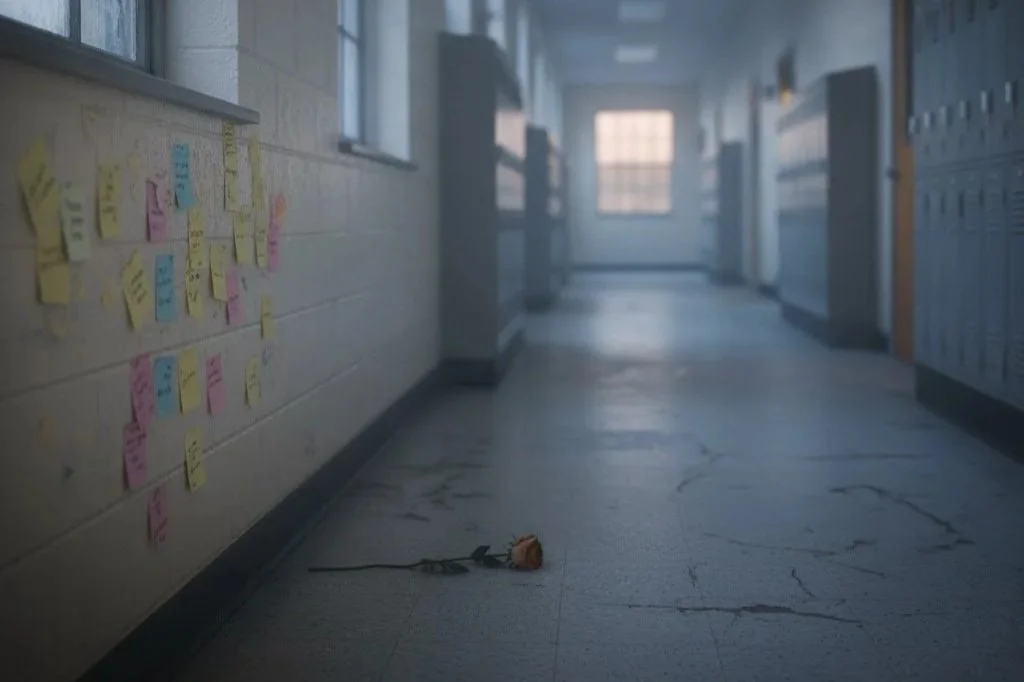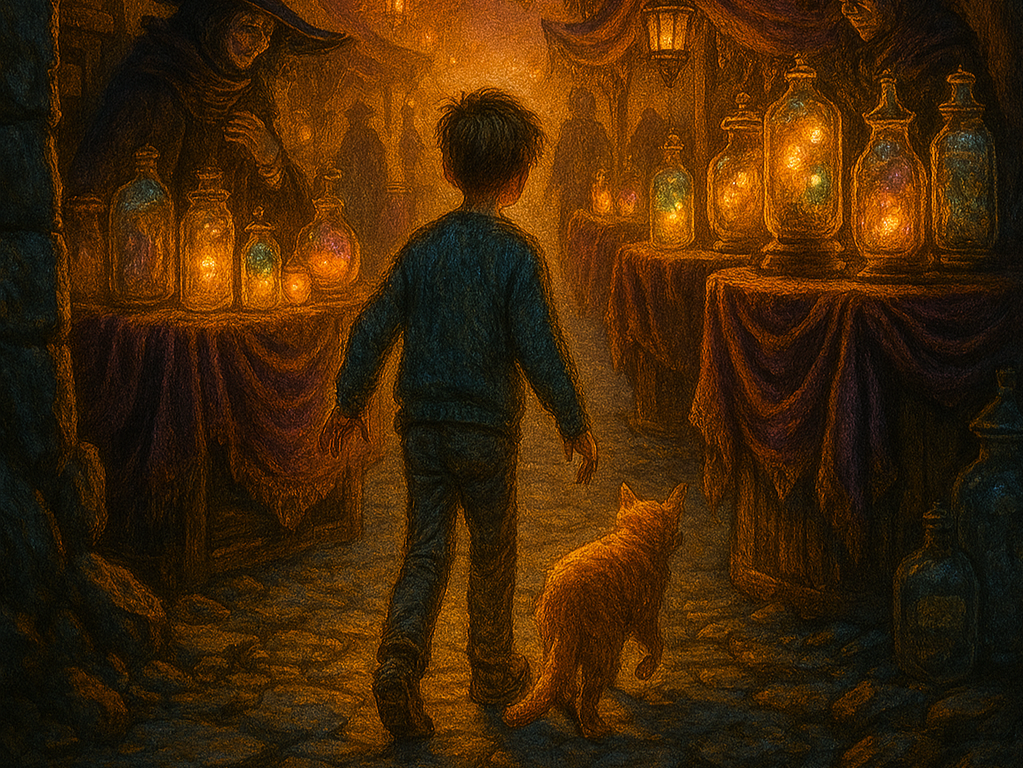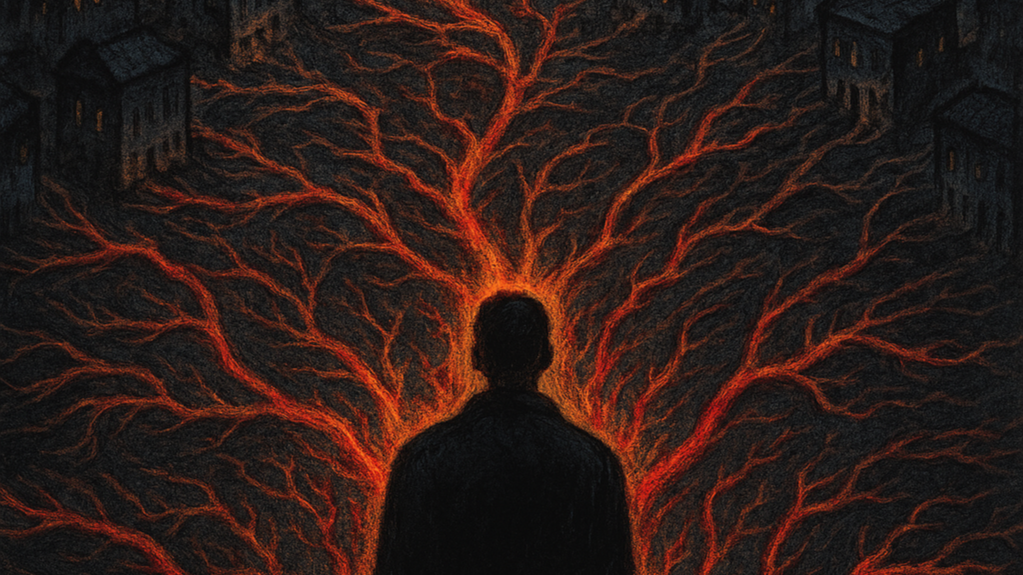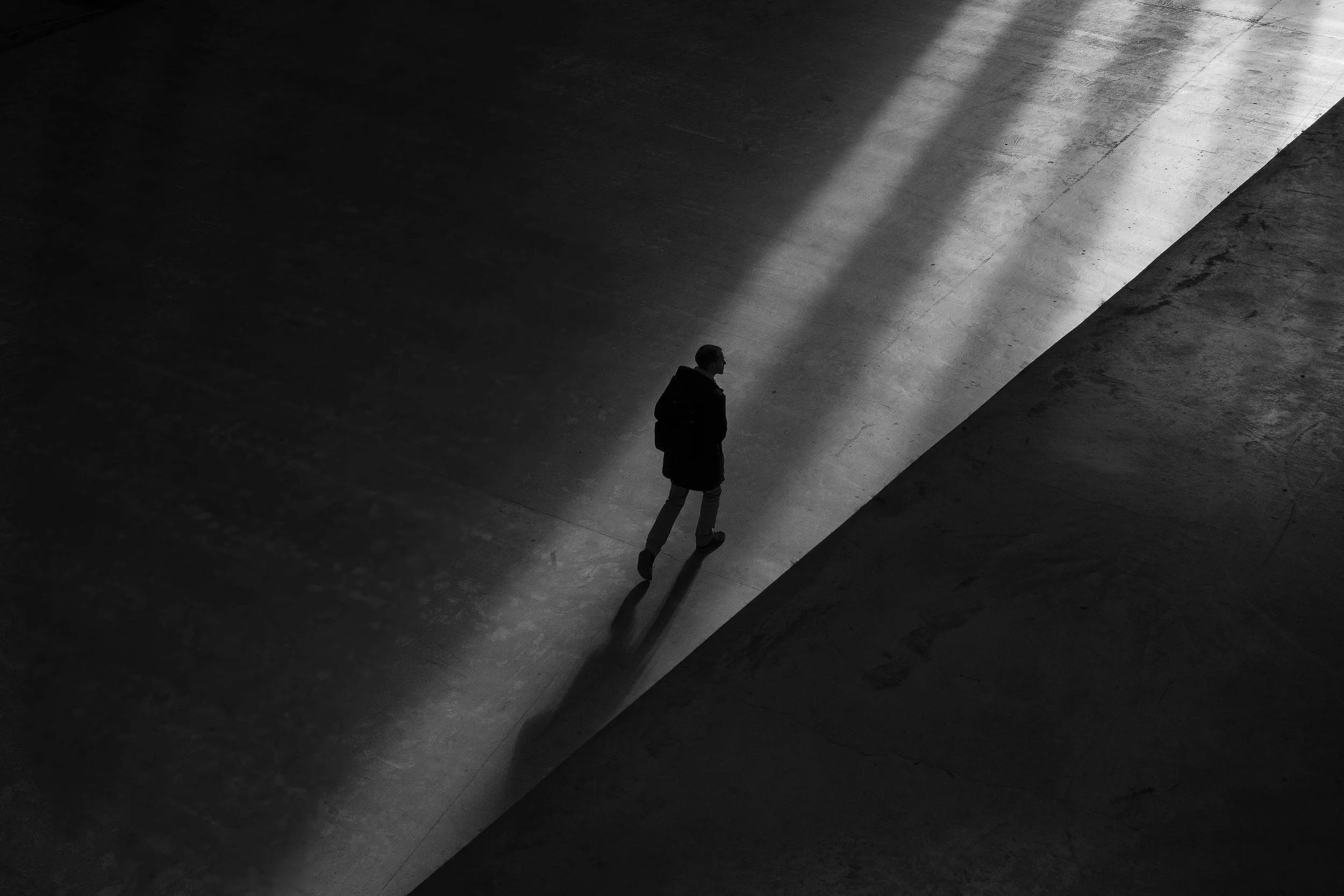The Well
The square was mostly empty, save for the squat, silent well and the long, inky shadows that stretched like the arms of an exhausted giant. It lay like a forgotten stage, its audience—the market traders, the gossiping citizens, the strolling lovers—long vanished, its actors dissolved into the hazy soup of memory. The lanterns that once cast a warm, friendly glow had guttered out hours ago, their final, oily breaths curling upward like the last sighs of old ghosts departing the scene. Now, the moon hung low and heavy; a bruised, half-drowned disc in the cloud cover, as if the sky itself were reluctant to bear witness to the profound, aching emptiness below.
Stone facades lined the perimeter of the square like weary sentinels, their windows shuttered tight against intrusion, their heavy doors sealed with the finality of a chapter closing. Each building wore its great age like a cloak—cracked plaster flaked away to reveal the bone of the brick beneath, paint that was once vibrant faded to the colour of old bone, and ivy crept like thick, sluggish veins across its skin, binding it to the earth. The cobblestones, slick with a cold, insistent dew, glimmered faintly under the moon’s diluted gaze, not like gems, but like relics laid out for a ritual no one remembered how to perform anymore.
The well stood at the absolute centre, the focal point of all this decay and silence, squat and deeply still, its mouth yawning open like a dark, unhealing wound in the earth. Moss clung to its rim in thick, green whispers, and the rope that dangled into its unseen depths swayed ever so gently, though the night air was too still to carry a wind. It seemed to breathe, a slow, deep intake and release, as if dreaming of the hands that once worked the crank, of the laughter echoing off its stone sides, of the metallic chime of coins tossed in with hopeful wishes that never quite reached the bottom of its secret cavity. It was an anchor, a testament to the fact that life once thrived here, pulling sustenance from the very ground.
A sudden, fluid ripple of motion broke the stillness. A cat emerged from the gloom of an alleyway, its fur the colour of liquid ink, its eyes twin embers of cool, emerald light. It moved without sound, an embodiment of the night’s stealth. It paused at the lip of the well, its delicate ears twitching, its tail flicking with the precision of a metronome marking time. For a long moment, it seemed to listen; not to any present sound, for there was none, but to the silence itself, to the profound and overwhelming absence of sound. Then, with the same effortless grace with which it arrived, it vanished, swallowed by the consuming dark as completely as if it had been nothing more than a momentary figment of the square’s restless imagination.
Above, the moon sagged lower toward the horizon, a pale coin spent too often and now worthless. Clouds drifted across its face like gauze pulled over a secret, and the few visible stars blinked behind them, uncertain and shy, like hesitant witnesses. The vast, vaulted sky itself seemed to hesitate, as if unsure whether to continue the slow turn of the night or to fold in on itself and admit defeat to the oppressive stillness.
Yet something lingered in that thick, moon-drenched air. It was not sound, nor was it scent, but a tangible, heavy presence. A hush saturated with memory. It was the kind of air that feels heavier than it should, as if the very space is holding its breath. The square remembered. It remembered the scraping footfalls, the clamour of a thousand forgotten voices, the rattle of hastily set-up market stalls, the soft, private hush of lovers exchanging secrets beneath the oil lamps. It remembered joy and grief braided together like bright and dark ribbons in a child’s hair.
Now, it simply waited. Not necessarily for the dawn, which would inevitably come and burn away the shadows. But it waited for return. For the revival of ritual. For the cheerful, metallic sound of the rope crank turning and the drawing of water. For the moment when the silence would finally break—not with mere noise, but with meaning. Until then, it remained as it was: a threshold. A long, deep pause. A single, held breath between one story and the next.
In a kingdom where the King declares war on numbers, communicates with pineapples, and maps military strategies on breakfast cereals, young Peabody might be the only sane person left—though that's not saying much when you live in a treehouse held together by duct tape and stubbornness, fifty feet above where the ground used to be before your grandmother accidentally knitted it into a cushion. When the Princess vanishes and the palace descends into weaponised chaos involving backwards bagpipe music, a philosophising baked bean drowning in custard, and a teddy bear whose broken watch hums Andrew Lloyd Webber as a form of prophecy, Peabody is summoned to solve the mystery using his greatest talent: the ability to listen without screaming about root vegetables. What he discovers is far more dangerous than any kidnapping—a clever girl who's had quite enough of the madness, a machine that translates nonsense into sense, and the revolutionary idea that perhaps, just perhaps, a kingdom shouldn't be run like an elaborate joke that's forgotten its punchline.
After a student dies, his classmates build a memorial wall, organise a tribute gig, and perform their grief for an audience. But as the event approaches, some of them begin to ask uncomfortable questions about who they're really doing this for and why no one noticed when it mattered.
A meticulous scholar obsessed with achieving perfection through dark magic has left a trail of disappeared victims across Victorian London. As he prepares his final, most powerful ritual, a rational detective follows an impossible pattern of evidence that challenges everything he believes about reality. When their paths collide, logic confronts the supernatural in a desperate race to stop a man who has discovered that reality itself can be reshaped—at a terrible cost. A psychological dark fantasy where obsession, horror, and investigation intertwine in the shadowy streets of a city hiding ancient secrets.
A teenager rebuilding after a breakdown walks the estuary bridge each day, a ritual of solitude and recovery. One October afternoon, they encounter Daniel Keppler, a former bully, standing alone at the railings. Their eyes meet. No words pass. The next day, news arrives: Daniel took his life that night.
Haunted by the encounter, the protagonist begins to sketch: the bridge, the water, Daniel's unknowable final moments. Through ritual and imagination, they process what can never be understood: two damaged people crossing paths at the threshold, each carrying something too heavy to name.
A quiet story about survival, silence, and the weight of witnessing.
Lydian, a skilled archivist surviving under a monetised welfare system, struggles to maintain her independence while paying a steep social and magical price. When a city-wide Arcane collapse exposes the failure of the Doctrine of Autonomy, she and a grassroots practitioner, Nara, ignite a Sympathy-based mutual-aid movement that rewrites the city’s rules and replaces shame with shared care.
After she breaks the sealed Archive, Sona must race below the city to stabilise its failing heart. The stakes: a flood of stolen emotions that could either save or undo Caer Selenis.
A boy follows his cat into a magical market that trades in feelings. After trading away his shame to reclaim a keepsake, he must decide whether to keep his memories—even the painful ones—or hand them over.
A living city mourns for a populace that trades away its memories—this lyrical, haunting novel explores grief, compassion, and political cruelty in a world where architecture feels. Heart-wrenching and profound, The Annals of Misread Intentions will leave you transformed. Purchase your copy and feel Threnith's heartbeat today.
set in a suffocating, dystopian future where a man named Kai is undergoing a final parole assessment in "The Chamber."
A post-apocalyptic story about a young Boy and his telepathic dog, Grit,
Ten-year-old Elia and her older brother Nico always knew their Grandma Marn’s cottage was an exceptional place—a labyrinth of ticking clocks and whispering cupboards nestled in the roots of a mossy hill.
But on the morning Marn dies, the house stops breathing. The kettle falls silent. Every clock locks at 6:08. The doors seal shut.
While the City of Amnesty operates under the Law of Inherent Flaw, condemning individuals whose reflection shows an Eternal Stain, Solen's purpose is to challenge this narrow, dispositional view.
Dr. Alistair Finch, a child development researcher, whose orderly life is disrupted by his neurodivergent daughter, Elara. When Elara begins leaving seemingly random objects around their house
A psychological thriller about Clara Hawthorne, a criminal profiler specialising in the anatomy of pathological behaviour, who is working a cold case involving a methodical serial killer.
A quiet meditation on parenting, attachment, and the choreography of care.
A lyrical street-level chorus of longing, fear, and fragile hope, narrated by the pavement itself.
A haunting meditation on memory, silence, and the lingering presence of forgotten ritual.
A five-part meditation on the moments we don’t speak aloud. Each vignette is a study in implication:
A psychological retelling of the Gingerbread Man story. The Gingerbread Man runs not just to avoid being eaten, but because the frantic repetition is the only rhythm that keeps him from dissolving.
A poignant short story about Dr. Malcolm Forrester, a recently deceased physics professor, who finds himself in a transitional room between the two titular doors.
A dark horror story centred on Sara, a girl distraught by her height, who is lured into a crooked house by an old woman offering coffee and a mysterious 'sweetener' pill.
Leo struggles to understand the sudden, secretive changes in his older brother, Alfie.























Some people move through the world making noise. Thirteen-year-old Leo has learnt to be still. But when an old illustrated book vanishes from the bookshelf, Leo discovers something extraordinary living in the walls of the Victorian house: the Snibbit, a small magical creature that collects beautiful things and understands that silence can be full of meaning. Through carefully preserved fragments from the past, the Snibbit teaches Leo how to navigate a world that isn't built for quiet people.